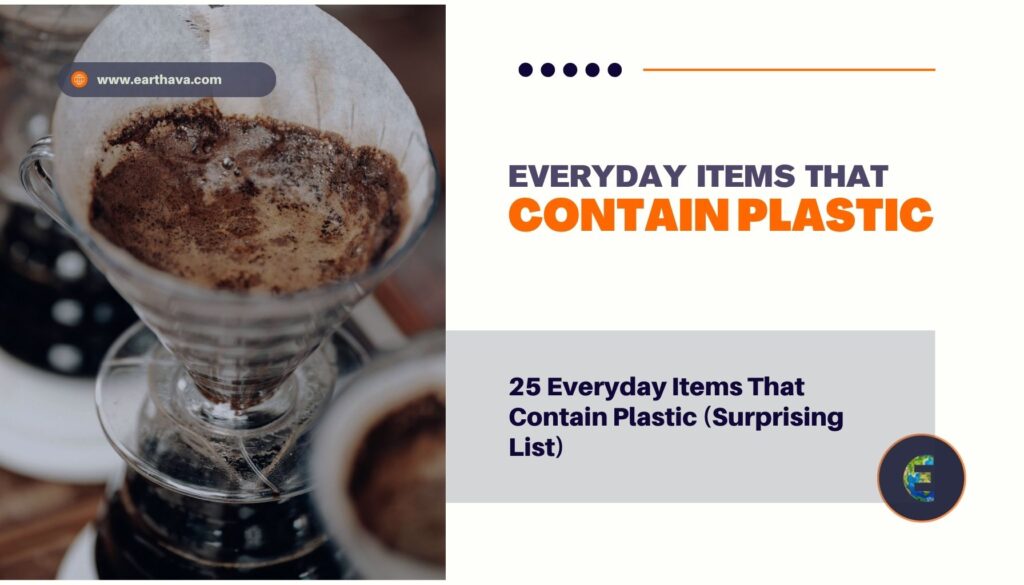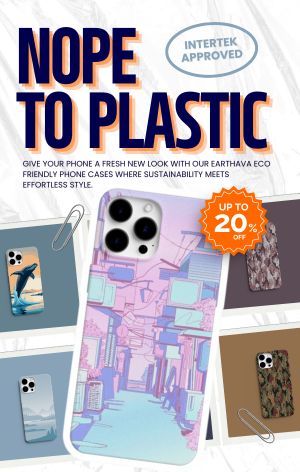Plastic has revolutionized our everyday lives. Manufacturers and consumers immediately appreciated the benefits of the lightweight, durable, and water-resistant material. However, the consequences of this choice have only now become apparent.

Plastic is not biodegradable and accumulates in every corner of the planet. We should introduce mandatory sorting of plastic waste, but it is not so easy because we simply don’t know every item in which it is used.
We would like to refresh your view of ordinary things in your day-to-day life and remind you that it is not only bottles and plastic straws that contain this hard-to-degrade substance, which has permeated all areas of our lives, but which we should give up as soon as possible.
Cardboard and paper food packaging
We have always been convinced that paper packaging is the salvation from plastic slavery, but it is not. Packaging can contain plastic in its structure or a thin insulating layer of plastic to keep the cardboard from getting wet.
LED Light bulbs
The era of glass and metal is gone to give way to plastic to replace both. Now the body of each bulb is made of a more resistant material that has all the necessary properties except environmental friendliness.
Cigarette butts
Cloth-like filters have a plastic structure to stop small particles of cigarette smoke. They are also cheaper to produce than natural materials.
Glass jar lids
Glass jars reduce the use of plastic, but when you close them hermetically, you use a plastic lid or a plastic-coated lid.
Envelopes
It would be a shame if your letter got wet or fell out of a damaged package. A plastic-covered envelope will protect your correspondence but not your future. Try using email or messenger instead.
Chewing Gum
Manufacturers prefer to keep quiet about the fact that some of the rubber from chewing gum has a common origin with the plastic from car tires.
Teabags
The small amount of plastic in the texture of a teabag allows it to hold its shape when heated. They also hold their shape well in the trash for hundreds of years.
Sea Salt
Salt extracted from salt water contains particles of plastic that ended up in the sea as waste and have now successfully returned to our plate.
Tampons
Hygiene demands sterility, disposability, and reliability. So most of the plastic used in these products is in the packaging.
Wet Wipes
Wet wipes can resemble their paper equivalent, but you definitely shouldn’t flush them down the pipe to avoid clogging since water won’t dissolve them.
Sunscreen
Creams that protect us from the sun do not fall under the restrictions that have been placed on the composition of cosmetic products. This micro-flaw allowed the use of microplastics in UV creams until now.
Shower Gel
Despite the restrictions, some manufacturers still use microplastics in their products as a supplement to mechanically cleanse the skin. If we don’t change that, our planet is going to need a macro cleansing.
Contact Lenses
More and more people are using lenses made of non-biodegradable material and fewer are thinking about recycling them. Perhaps global pollution will force us to open our eyes.
Toothpaste
Although we have convinced the marketers that we value natural products, they are still selling us microplastics in oral cleaners.
Lipstick
Using plastic in lipstick is the cheapest way to provide rich color and shine to your lips.
Crispy Wrap
Most snacks and prepared foods want to keep their freshness on the way to our house. Unfortunately, it is the plastic contained in the packaging that can share its “long-lasting” properties.
Beer
We hope the beer itself does not contain plastic, but the inside of the lid does.
Cans
Iron or even aluminum cans do not react well with the liquid inside. Luckily they don’t rust because of the plastic insulating layer.
Tetra pack
Large milk or juice cartons cannot be thrown in the paper waste bin. There is a layer of aluminum and plastic inside that ensures the freshness of your drinks.
Coffee filters
Paper coffee filters are bought and discarded in bulk. Although they are “paper” the small amount of plastic in them ensures that they stay in the trash longer than they do in your kitchen.
Pillows
Hypoallergenic pillow fillings may be salvation for those who can’t sleep on natural down products but will become a sentence for the rest if we oversleep the moment when we should stop making them from plastic and prefer natural materials.
Baking paper
We live in a time when the word “paper” has little credibility. Even your baked goods would be worse without the secret ingredient: plastic.
Colored pencils
Wood is too precious a resource to use for all pencils. This is why most office supplies use wood-like plastic.
Glitter
Looks incredibly beautiful and dazzling, but uses microplastic.
Cleaning supplies
Packaging and substances abuse the use of a resistant material that will remove stains, but will become a new pollution problem.
The widespread use of non-biodegradable materials worries more and more people and humanity is beginning to throw off the plastic shackles. Alternative materials are attracting large investments and we hope that one day we will be able to minimize the production of garbage or do away with plastic altogether.
The first step is to raise awareness of the problem and spread the word that plastic is harmful. The next step is to change our daily habits and consumer behavior.
But we should not forget that most brands prefer to use the prefix “eco” as an advertising ploy or to justify an inflated price. So we can’t trust the ads and recommend that you stick to them. Always check the ingredients and prefer local producers you trust. Choose conscious consumption as a way of life and together we will save our environment.


